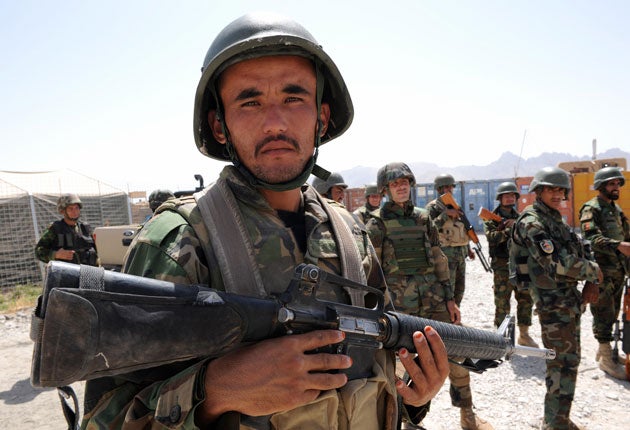Kim Sengupta: No quick fix when it comes to training the Afghan army

Your support helps us to tell the story
From reproductive rights to climate change to Big Tech, The Independent is on the ground when the story is developing. Whether it's investigating the financials of Elon Musk's pro-Trump PAC or producing our latest documentary, 'The A Word', which shines a light on the American women fighting for reproductive rights, we know how important it is to parse out the facts from the messaging.
At such a critical moment in US history, we need reporters on the ground. Your donation allows us to keep sending journalists to speak to both sides of the story.
The Independent is trusted by Americans across the entire political spectrum. And unlike many other quality news outlets, we choose not to lock Americans out of our reporting and analysis with paywalls. We believe quality journalism should be available to everyone, paid for by those who can afford it.
Your support makes all the difference.The training of the Afghan security forces is a key element in the West's exit strategy from Afghanistan and there is considerable focus on whether this is actually being achieved.
What is being described as a "definitive report" into the strategy of the conflict, to be presented by General Stanley A McChrystal, the American commander of Nato forces in the country, will recommend increasing the size of the national army from the present 88,000 to 134,000. Police numbers are to rise from 82,000 to 120,000.
Already, there is a policy of pushing the Afghan security forces to become the public face of most military operations. Sometimes they are in the thick of the fighting; on other occasions they are pushed to the forefront in captured areas after most of the combat has been fought out by British, American and other Nato soldiers.
There is certainly evidence that the quality of the Afghan army has improved. Afghanistan's turbulent history has ensured that many of the soldiers do not lack experience of warfare, indeed they show almost reckless bravery, and this has been channelled to an extent through training and "mentoring".
But there is still a long way to go to change the mentality of many in the ranks. I have just returned from an operation where the Afghans fought bravely and with enthusiasm. They were also impatient, and had to be restrained, not always successfully, from charging off in pursuit of the enemy. Their tendency to open fire, at times at random, introduced an element of serious confusion to the battleplan.
The sheer tempo of the action means that the training process, already tightly drawn, has been curtailed even further in places experiencing the bulk of the fighting, such as Helmand. After an initial 12-week basic course in Kabul, recruits are to undergo an intense three-week session before they deploy to the front. At the British-run training centre in Camp Tombstone this has been reduced to three days. The pressure to churn out fighting men has become even further intensified as security preparations go into overdrive in preparation for the imminent national elections.
A lot of the Afghan soldiers are also physically and mentally tired. Their terms of service mean it is the luck of the draw whether they end up in the south, where most of the fighting is, or the less dangerous north or west. Having arrived somewhere like Helmand, they must serve at this front for three or four years before the prospect of a transfer. Despite these problems, progress is being made with the army.
The Afghan police have an even steeper climb. They have faced repeated allegations of corruption and, in some cases, collusion with the Taliban. Unlike the soldiers, the policemen serve in their home areas. This gives them vital local knowledge but it also means that they and their families are susceptible to intimidation by the Taliban and drug barons. It is also the case that the police are far more poorly equipped than the army and often have little training.
Considerably more resources and time are being devoted to training the Afghan security forces. But what is abundantly clear is that it is not going to be a quick fix.
Join our commenting forum
Join thought-provoking conversations, follow other Independent readers and see their replies
Comments